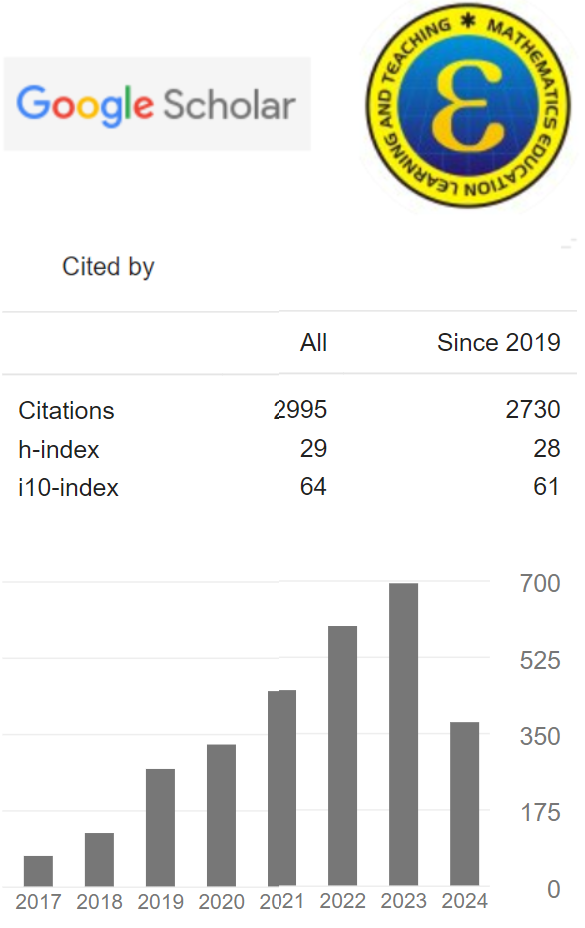Rasch Model Analysis: Validity and Reliability of Context-Based Geometry Performance Assessment Instruments Jakarta Cultural Heritage
(1) Universitas Negeri Jakarta
(2) Universitas Negeri Jakarta
(3) Universitas Negeri Jakarta
(*) Corresponding Author
Abstract
Keywords
Full Text:
PDFReferences
Alfiatin, A. L., & Oktiningrum, W. (2019). Pengembangan Soal Higher Order Thinking Skills Berbasis Budaya Jawa Timur untuk Mengukur Penalaran Siswa SD. Indiktika : Jurnal Inovasi Pendidikan Matematika, 2(1), 30–43. https://doi.org/10.31851/indiktika.v2i1.3395
Anis, D., Rohendi, D., & Sukandar, A. (2019). Pengembangan Instrumen Penilaian Kinerja Siswa Pada Praktikum Gambar Proyeksi Ortogonal. Journal of Mechanical Engineering Education, 6(2), 161–167. https://doi.org/10.17509/jmee.v6i2.21787
Boone, W. J., Staver, J. R., & Yale, M. S. (2014). Rating Scale Surveys. In Rasch Analysis in the Human Sciences (pp. 21–46). Dordrecht: Springer Netherlands. https://doi.org/10.1007/978-94-007-6857-4_2
Brookhart, S. M. (2015). Performance Assessment: Showing What Students Know and Can Do. Learning Sciences International.
Faturrahmann, A., Fachly, A. F. R., Bhakti, T. S. D., Putri, E. N., Puspitasari, C., & Arni, M. (2022). ADAPTATIVE REUSE DAN PENDEKATAN CONTEXTUAL JUXTAPOSITION PADA STASIUN JATINEGARA, JAKARTA. Lakar: Jurnal Arsitektur, 5(2), 115. https://doi.org/10.30998/lja.v5i2.14470
Fisher, W. P. (2007). Rating scale instrument quality criteria. In Rasch measurement transactions: Vol. 21(1), 1095.
Fitri. (2017). Analisis Validitas dan Reliabilitas Instrumen Kinerja Akuntan Menggunakan Pendekatan Rasch Model. Jurnal Ilmiah Akuntansi Peradaban, 3(1), 34–45.
Indihadi, D., Suryana, D., & Ahmad, A. B. (2022). The Analysis of Construct Validity of Indonesian Creativity Scale Using Rasch Model. Creativity Studies, 15(2), 560–576. https://doi.org/10.3846/cs.2022.15182
Karami, H. (2015). Book review: Rasch Analysis in the Human Sciences. Language Testing, 32(4), 545–548. https://doi.org/10.1177/0265532214567642
Kartikasari, D. A., & Rahayu, W. (2018). Pemahaman Matematika : Penerapan Model Arcs. Jurnal Evaluasi Pendidikan, 9, 6–15. Retrieved from doi.org/10.21009/JEP.091.02%0D
Khatimin, N., Aziz, A. A., Zaharim, A., & Mat Yasin, S. H. (2013). Development of Objective Standard Setting Using Rasch Measurement Model in Malaysian Institution of Higher Learning. International Education Studies, 6(6). https://doi.org/10.5539/ies.v6n6p151
Khoriyah, M., & Oktiningrum, W. (2021). Pengembangan soal higher order thinking Skills (HOTS) berbasis budaya lokal blitar untuk mengukur dimensi pengetahuan matematika siswa kelas V sekolah dasar. Bina Gogik: Jurnal Ilmiah Pendidikan Guru Sekolah Dasar, 8(1), 2579–4647.
Loewenthal, K. M., & Lewis, C. A. (2001). An Introduction to Psychological Tests and Scales. Psychology Press. https://doi.org/10.4324/9781315782980
Martinková, P., & Zvára, K. (2007). Reliability in the Rasch model. Kybernetika. Retrieved from http://eudml.org/doc/33860
Misbach, I. H., & Sumintono, B. (2014). Pengembangan dan Validasi Instrumen Persepsi Siswa Tehadap Karakter Moral Guru di Indonesia dengan Model Rasch. PROCEEDING Seminar Nasional Psikometri, 148–162.
Muslihin, H. Y., Suryana, D., Ahman, A., Suherman, U., & Dahlan, T. H. (2022). Analysis of the Reliability and Validity of the Self-Determination Questionnaire Using Rasch Model. International Journal of Instruction, 15(2), 207–222. https://doi.org/10.29333/iji.2022.15212a
Nasir, A. M., & Syartina, S. (2021). The Effectiveness of the Polya Model Problem Solving Method on Student Learning Outcomes in Solving Math Story Problems. Eduma : Mathematics Education Learning and Teaching, 10(2), 127. https://doi.org/10.24235/eduma.v10i2.8700
Ningsih, G., & Rahayu, W. P. (2021). Pengembangan Instrumen Penilaian Psikomotor Berbasis Proyek Untuk Meningkatkan Kompetensi Psikomotor Siswa Dalam Pembelajaran Blended Learning Di Era New Normal. Jurnal Ekonomi, Bisnis Dan Pendidikan, 1(34), 418–424. https://doi.org/10.17977/um066v1i52021p418-424
Nordrum, L., Evans, K., & Gustafsson, M. (2013). Comparing student learning experiences of in-text commentary and rubric-articulated feedback: strategies for formative assessment. Assessment & Evaluation in Higher Education, 38(8), 919–940. https://doi.org/10.1080/02602938.2012.758229
Oberg, C. (2010). Guiding Classroom Instruction Through Performance Assessment. Journal of Case Studies in Accreditation and Assessment, 1, 1–11.
Ocy, D. R., Rahayu, W., & Makmuri, M. (2023). RASCH MODEL ANALYSIS: DEVELOPMENT OF HOTS-BASED MATHEMATICAL ABSTRACTION ABILITY INSTRUMENT ACCORDING TO RIAU ISLANDS CULTURE. AKSIOMA: Jurnal Program Studi Pendidikan Matematika, 12(4), 3542. https://doi.org/10.24127/ajpm.v12i4.7613
Panadero, E., & Jonsson, A. (2013). The use of scoring rubrics for formative assessment purposes revisited: A review. Educational Research Review, 9, 129–144. https://doi.org/10.1016/j.edurev.2013.01.002
Polya, G. (1973). How To Solve (2nd Ed). Princeton: University Press.
Purnomo, Y. W. (2013). Komputasi Mental untuk Mendukung Lancar Berhitung Operasi Penjumlahan dan Pengurangan pada Siswa Sekolah Dasar. Seminar Nasional Matematika Dan Pendidikan Matematika, (November), 657–662.
Putra, Z. H., Hermita, N., & Alim, J. A. (2021). Analisis Pengetahuan Matematika, Didaktika, dan Teknologi Calon Guru Sekolah Dasar Menggunakan Rasch Model. Mosharafa: Jurnal Pendidikan Matematika, 10(3), 345–356. https://doi.org/10.31980/mosharafa.v10i3.1042
Ratumanan, T. G., & Laurens, T. (2016). Analisis Penguasaan Objek Matematika. Jurnal Pendidikan Matematika Raflesia, 1(2), 146–154. https://doi.org/10.33369/jpmr.v1i2.4005
Salsabila, F., Nurihsan, J., & Sunarya, Y. (2023). Pengujian Validitas dan Reliabilitas Instrumen Manajemen Diri Remaja:Rasch Model Analysis. Jurnal Bimbingan Dan Konseling Terapan, 07(01), 86–102. Retrieved from https://ojs.unpatti.ac.id/index.php/bkt/article/view/234/158
Sarwoedi, S., Marinka, D. O., Febriani, P., & Wirne, I. N. (2018). Efektifitas etnomatematika dalam meningkatkan kemampuan pemahaman matematika siswa. Jurnal Pendidikan Matematika Raflesia, 3(2), 171–176. https://doi.org/https://doi.org/10.33369/jpmr.v3i2.7521
Sumintono, B. (2018). Rasch Model Measurements as Tools in Assesment for Learning. Proceedings of the 1st International Conference on Education Innovation (ICEI 2017). Paris, France: Atlantis Press. https://doi.org/10.2991/icei-17.2018.11
Sumintono, B., & Widhiarso, W. (2015). Aplikasi pemodelan rasch pada assessment pendidikan. In Trim komunikata. Trim komunikata.
Suryani, Y. E. (2018). Aplikasi Rasch Model dalam Mengevaluasi Intelligenz Structure Test (IST). Psikohumaniora: Jurnal Penelitian Psikologi, 3(1), 73. https://doi.org/10.21580/pjpp.v3i1.2052
Taufiq, A., Yudha, E. S., Md, Y. H., & Suryana, D. (2021). Examining the Supervision Work Alliance Scale: A Rasch Model Approach. The Open Psychology Journal, 14(1), 179–184. https://doi.org/10.2174/1874350102114010179
Yasin, R. M., Yunus, F. A. N., Rus, R. C., Ahmad, A., & Rahim, M. B. (2015). Validity and Reliability Learning Transfer Item Using Rasch Measurement Model. Procedia - Social and Behavioral Sciences, 204, 212–217. https://doi.org/10.1016/j.sbspro.2015.08.143
Yudha, R. P. (2020). Validity And Reliability Rubric Of Performance Assessment Geometry Study In Junior High School Using The Many Facet Rasch Model Approach. Eduma : Mathematics Education Learning and Teaching, 9(2), 26. https://doi.org/10.24235/eduma.v9i2.7100
Zakiah, I., Hendriana, H., & Hidayat, W. (2022). The Effect of Contextual Learning Trough Teaching Materials Application-Based on Problem Solving Ability. Eduma : Mathematics Education Learning and Teaching, 11(1), 20. https://doi.org/10.24235/eduma.v11i1.9604
DOI: 10.24235/eduma.v13i2.18136
Article Metrics
Abstract view : 301 timesPDF - 54 times
Refbacks
- There are currently no refbacks.
Copyright (c) 2024 EduMa: Mathematics education learning and teachingâ€â€â€Ž


.png)










